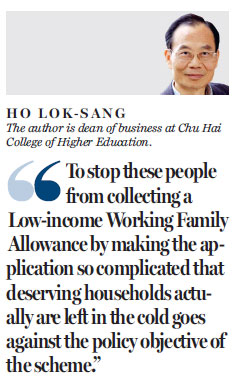Allowance for low-income earners should be simple
Updated: 2016-09-27 07:47
By Ho Lok-sang(HK Edition)
|
|||||||
Ho Lok-sang defends the Low-income Working Family Allowance - arguing that it shows the govt is committed to serving HK people, but says the application procedures could be made less complicated
The advent of the Low-income Working Family Allowance is a historical breakthrough. In the past, the Hong Kong government had been extremely reluctant to commit itself to any program with recurrent spending implications. People should give credit to the SAR government for this and for other breakthroughs, which include the Mandatory Provident Fund (2000), the Savings Deposit Insurance (2006), the statutory minimum wage (2011), the Work Incentive Transport Subsidy Scheme (2011), the doubling of the Old Age Allowance to HK$2,200 a month for those elderly who pass a means test (2012), the Pre-primary Education Voucher Scheme (2013), the Residential Properties (First-hand Sales) Ordinance (2013), the Competition Law (2015), the free kindergarten policy (2016), and so on. These and other initiatives testify to the efforts of all the SAR administrations in serving Hong Kong people, particularly the underprivileged, and to the misleading nature of the popular allegation that the SAR government colludes with business interests. Indeed, quite the contrary is true. It should be common knowledge today that Chief Executive Leung Chun-ying is not popular with big businesses because many of his initiatives may hurt their profits. Any fair observer would have to acknowledge the kind of resistance from the business sector that he faces when he pushes initiatives such as greater transparency in the saleable areas of properties sold by developers and the special stamp duty.

I was on a panel with Mike Rowse and academics Benny Tai Yiu-ting and Li Hak-yin in a program hosted by Channel NewsAsia recently. Veteran and retired civil servant Rowse, who renounced his British citizenship and has been naturalized as a Chinese national, acknowledged that many of Leung's policies are good. Rowse mentioned in particular the great efforts the CE put into increasing land supply, though his uncompromising style undermines him. To me it is sad that "style" is sufficient to turn a large segment of the younger generation against him. Leung wants to portray himself as a doer. He wants to get things done. He was open enough to invite all those who opposed Moral and National Education to come together and to work out a curriculum in "the proper way". Those who opposed him refused. More recently, the Wang Chau development saga exposed the various interests involved, and Leung proposed to set up a platform so every stakeholder can join in to sort out the differences and work out compromises. Eddie Chu, the legislator-elect who had been questioning why the government cut the scale of the public housing development from 17,000 units to 4,000 units, refused. Politics is just too complicated. I have to admit I do not understand.
Coming back to the Low-income Working Family Allowance, the government just learnt that the number of applications and in particular the number of successful applications has fallen far short of expectations. A common complaint from applicants is that the application form is difficult to fill in and that too many documents are required. Certainly the form should be simplified. But the more important question is: Do we really need such strict rules?
There is the rule that within each six-month period for which the allowance is claimed, no family member can stay away from Hong Kong for more than 30 days. There is another rule stipulating an overall asset limit that varies with the size of the family. For a four-person family the asset limit (including the principal residence) is HK$500,000. Assets that need to be reported include cash, bank deposits, cash value of insurance policies, shares of stocks owned, properties other than the self-occupied home, car parks, cars, licenses of commercial vehicles, cash receivables, and tangible assets such as gold coins and jewelry. These requirements greatly increase the complexity of the application process. I would strongly advise dropping these requirements, based on the following reasons.
First, while it is important that the breadwinners of the household meet the minimum working-hour requirements for each month for which a claim for the allowance is filed, I see little need to disqualify the household just because someone stays away for more than 30 days within the six-month period. All that is needed is the demonstration that the breadwinners have worked at least the required hours and have garnered an income that makes supporting all their dependents difficult. If a member of the household spends time outside Hong Kong, that does not necessarily make him or her not a dependent. Very often, these cases have to do with visiting and staying with close relatives including grandparents. The government certainly should not discourage these family gatherings.
Second, it seems to me that if someone is willing to work for a very low wage that is prima facie evidence that they may not be very well off. Although in the past some rare cases do surface, such as some workers actually owning a fortune, these cases are extremely rare. To stop these people from collecting a Low-income Working Family Allowance by making the application so complicated that deserving households actually are left in the cold goes against the policy objective of the scheme.
(HK Edition 09/27/2016 page10)